有些网页我们请求的html代码并没有我们在浏览器里看到的内容。
因为有些信息是通过Ajax加载并通过JavaScript渲染生成的。
一.目标站点分析

查看的Ajax请求
选择network 勾选preserve log 再勾选XHR ,数据链接如左侧aid格式
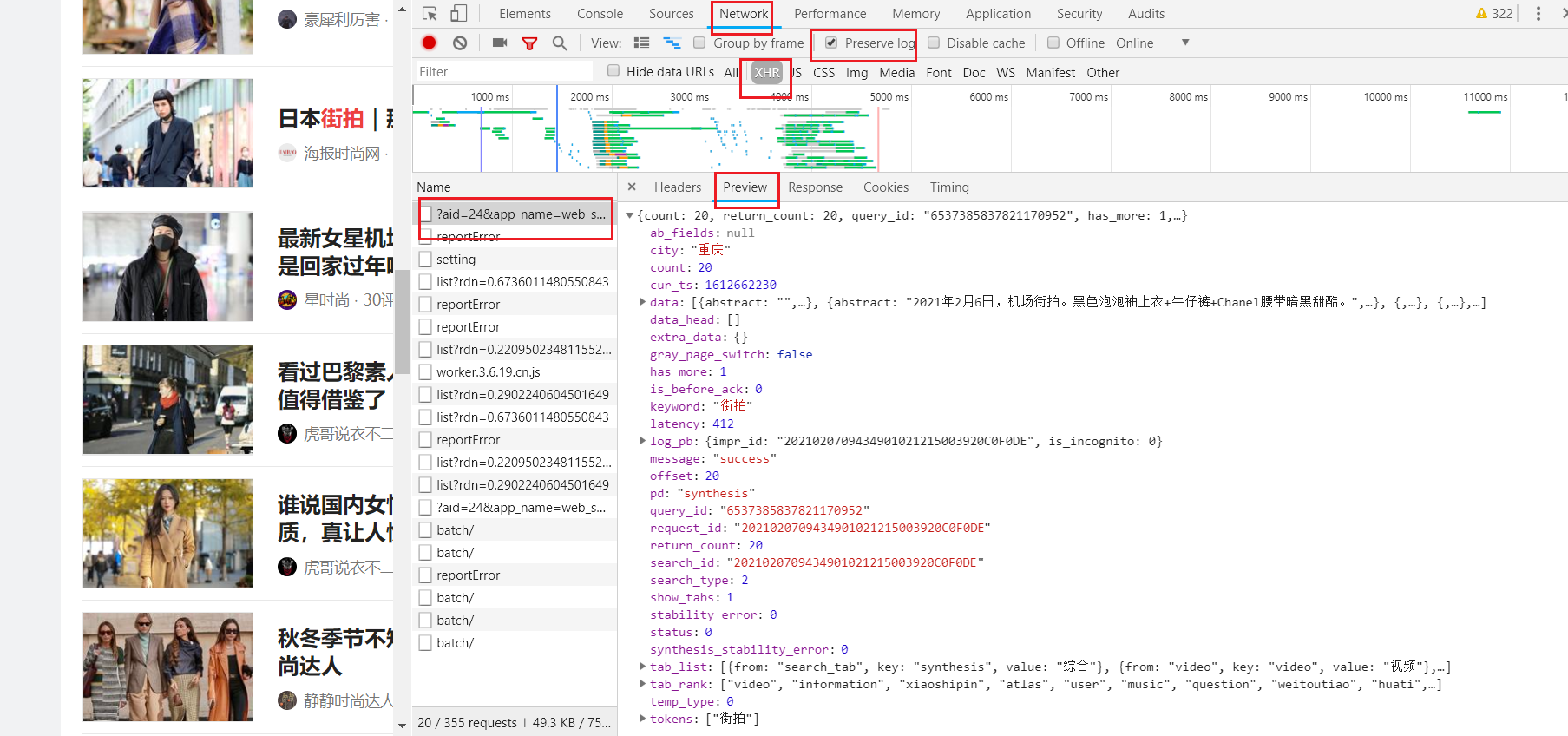
在data下面能够找到title

我们网页不断下滑,发现请求有offset有20,40,60变化。如图。
我们可以认为改变offset的值就能拿到不同数据。

通过观察data,发现数据是json数据。

实战
一.抓取索引页内容
1.查看URL
蓝色为基本url,其他为参数

这些参数在下图

急需下拉网页,只有offset在变化,每次变化20

获取html代码如下
from urllib.parse import urlencode
import requests
from requests.exceptions import ConnectionError
def get_page(offest,keyword):#获取请求并返回解析页面,offest,keyword为可变参数
params = {
'aid': '24',
'app_name': 'web_search',
'offset': offest,#页数
'format': 'json',
'keyword': keyword,#关键词,本例子为街拍
'autoload': 'true',
'count': '20',
'en_qc': '1',
'cur_tab': '1',
'from': 'search_tab',
'pd': 'synthesis',
'timestamp': '1612660795006',
'_signature': '_02B4Z6wo00f01bVt4zgAAIDCfdEqJspzHQm1SeeAAA1FfgsJs85FLGn5fddPtscCGmt-RCmotIguRxATrRA1jejsf0LuGWhNYZDSWZIqUdhBN1ivlGKkDtAdcHKqYiKRWjlQZt4s9AU2aI2d0c'
}
headers = {
'user-agent': 'Mozilla/5.0 (Windows NT 10.0; Win64; x64) AppleWebKit/537.36 (KHTML, like Gecko) Chrome/86.0.4240.75 Safari/537.36',
'x-requested-with': 'XMLHttpRequest'
}
base_url = 'https://www.toutiao.com/api/search/content/?'
url = base_url + urlencode(params)
try:
response = requests.get(url,headers = headers)
if response.status_code == 200 :
return response.text
except ConnectionError:
print('程序错误')
return None
def main():
base_url = 'https://www.toutiao.com/api/search/content/?'
html=get_page(0,'街拍')
print(html)
if __name__ =='__main__':
main()
 可以发现结果中有很多超链接
可以发现结果中有很多超链接

二.数据解析
回到浏览器,查看返回结果Respnse响应,数据格式为json格式

在Preview找到data
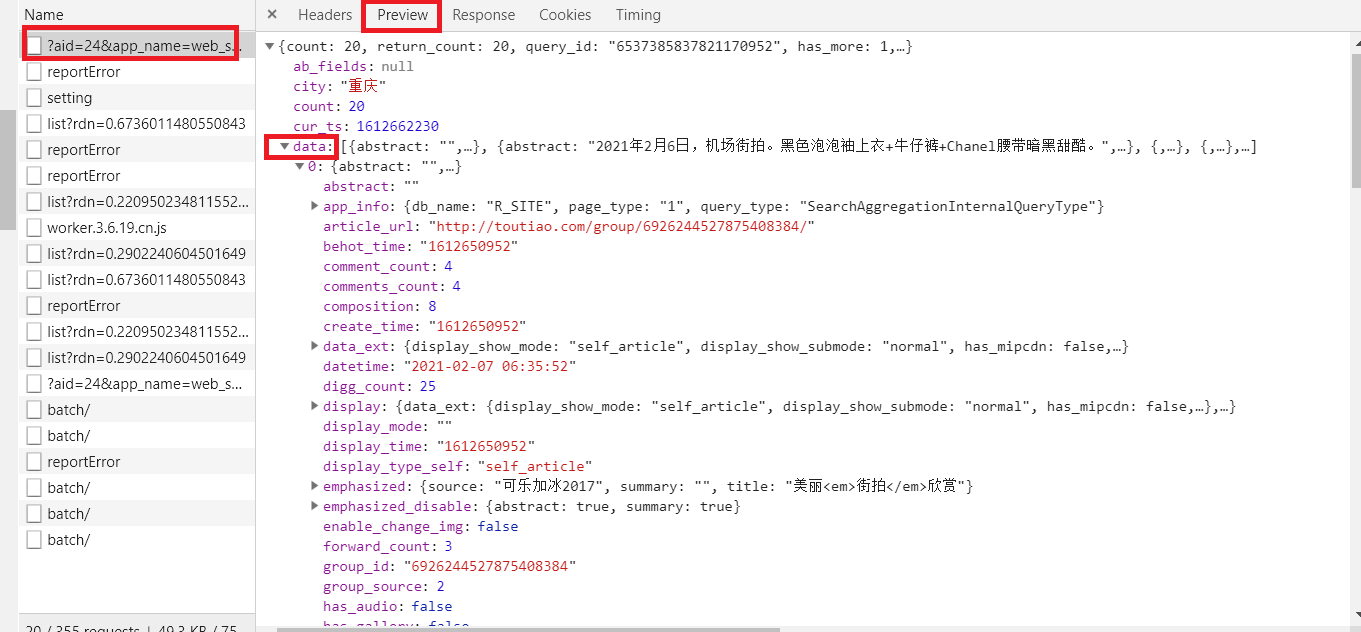
对data进行展开,其中的0,1,2.。均为一组街拍

展开0
图片url在image_list里

图片名titlie
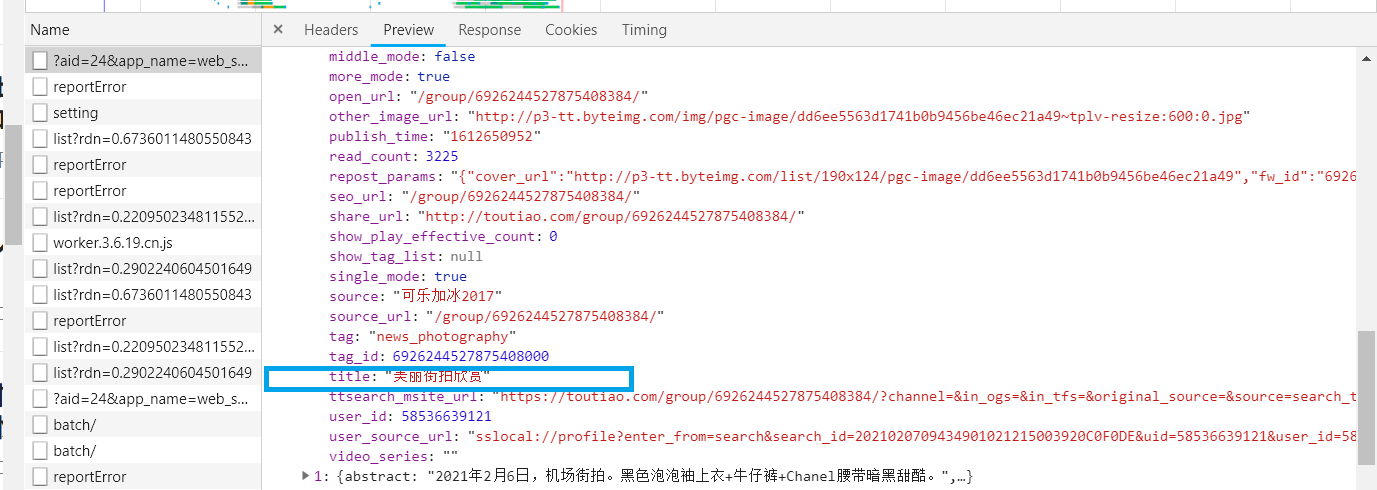
#数据解析
import json
def parse_page_index(html):
data=json.loads(html)#转换为json对象
if data and 'data'in data.keys():#判断响应里的data是否存在
for item in data.get('data'): # 用item循环每一条,即0,1,2...
# 这里需要判断image_list是否为空
title = item.get('title')
if 'image_list' in item and item['image_list'] != []:
images = item['image_list']
for image in images:
yield {
'image': image.get('url'),
'title': title
} # 返回的一个字典
yield用法见例子
返回的是一个可以迭代的对象
def getnum(n):
i = 0
while i <= n:
yield i
i += 1
a = getnum(5)
print(a)
for i in a:
print(i)
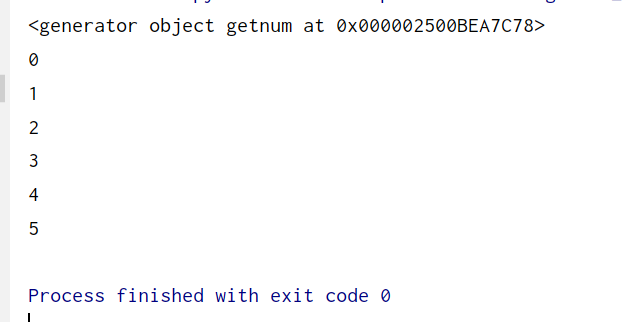
三.图片保存
import os
from hashlib import md5
def save_image(item):
#os.path模块主要用于文件的属性获取,exists是“存在”的意思,
#所以顾名思义,os.path.exists()就是判断括号里的文件夹'picture'+str(offset)是否存在的意思,括号内的可以是文件路径。
if not os.path.exists(item.get('title')):#判断当前文件夹下是否有该文件
os.mkdir(item.get('title'))#如果不存在就创建该文件夹
try:
response=requests.get(item['image']) #get函数获取图片链接地址,requests发送访问请求,上面那个字典
if response.status_code==200:
file_path='{0}/{1}.{2}'.format(item.get('title'),md5(response.content).hexdigest(),'jpg')
# md5摘要算法(哈希算法),通过摘要算法得到一个长度固定的数据块。将文件保存时,通过哈希函数对每个文件进行文件名的自动生成。
# md5() 获取一个md5加密算法对象
# hexdigest() 获取加密后的16进制字符串
if not os.path.exists(file_path):
with open(file_path,'wb') as f:
f.write(response.content)
print('图片保存路径是: ', file_path)
else:
print('图片已经下载',file_path)
except requests.ConnectionError:
print('图片保存失败')
md5(response.content).hexdigest()摘要算法(哈希算法),通过摘要算法得到一个长度固定的数据块。将文件保存时,通过哈希函数对每个文件进行文件名的自动生成。
示例
from hashlib import md5
hash_functions = [md5]
def get_hash_code(s):
result = []
hash_obj = md5(s)
hash_hex = hash_obj.hexdigest()
result.append((hash_obj.name, hash_hex, len(hash_hex)))
return result
if __name__ == '__main__':
s = "123"
result = get_hash_code(s.encode("utf-8"))
print(result)

总的代码
from urllib.parse import urlencode
import requests
from requests.exceptions import ConnectionError
import json
def get_page(offest,keyword):#获取请求并返回解析页面,offest,keyword为可变参数
params = {
'aid': '24',
'app_name': 'web_search',
'offset': offest,#页数
'format': 'json',
'keyword': keyword,#关键词,本例子为街拍
'autoload': 'true',
'count': '20',
'en_qc': '1',
'cur_tab': '1',
'from': 'search_tab',
'pd': 'synthesis',
'timestamp': '1612660795006',
'_signature': '_02B4Z6wo00f01bVt4zgAAIDCfdEqJspzHQm1SeeAAA1FfgsJs85FLGn5fddPtscCGmt-RCmotIguRxATrRA1jejsf0LuGWhNYZDSWZIqUdhBN1ivlGKkDtAdcHKqYiKRWjlQZt4s9AU2aI2d0c'
}
headers = {
'user-agent': 'Mozilla/5.0 (Windows NT 10.0; Win64; x64) AppleWebKit/537.36 (KHTML, like Gecko) Chrome/86.0.4240.75 Safari/537.36',
'x-requested-with': 'XMLHttpRequest'
}
base_url = 'https://www.toutiao.com/api/search/content/?'
url = base_url + urlencode(params)
try:
response = requests.get(url,headers = headers)
if response.status_code == 200 :
return response.text
except ConnectionError:
print('程序错误')
return None
#数据解析
import json
def parse_page_index(html):
data=json.loads(html)#转换为json对象
if data and 'data'in data.keys():#判断响应里的data是否存在
for item in data.get('data'): # 用item循环每一条,即0,1,2...
# 这里需要判断image_list是否为空
title = item.get('title')
if 'image_list' in item and item['image_list'] != []:
images = item['image_list']
for image in images:
yield {
'image': image.get('url'),
'title': title
} # 返回一个字典
import os
from hashlib import md5
def save_image(item):
#os.path模块主要用于文件的属性获取,exists是“存在”的意思,
#所以顾名思义,os.path.exists()就是判断括号里的文件夹'picture'+str(offset)是否存在的意思,括号内的可以是文件路径。
if not os.path.exists(item.get('title')):#判断当前文件夹下是否有该文件
os.mkdir(item.get('title'))#如果不存在就创建该文件夹
try:
response=requests.get(item['image']) #get函数获取图片链接地址,requests发送访问请求,上面那个字典
if response.status_code==200:
file_path='{0}/{1}.{2}'.format(item.get('title'),md5(response.content).hexdigest(),'jpg')
# md5摘要算法(哈希算法),通过摘要算法得到一个长度固定的数据块。将文件保存时,通过哈希函数对每个文件进行文件名的自动生成。
# md5() 获取一个md5加密算法对象
# hexdigest() 获取加密后的16进制字符串
if not os.path.exists(file_path):
with open(file_path,'wb') as f:
f.write(response.content)
print('图片保存路径是: ', file_path)
else:
print('图片已经下载',file_path)
except requests.ConnectionError:
print('图片保存失败')
def main():
for offest in range(0, 60, 20):
html = get_page(offest, '街拍')
a = parse_page_index(html)
for item in a:
save_image(item)
if __name__ =='__main__':
main()
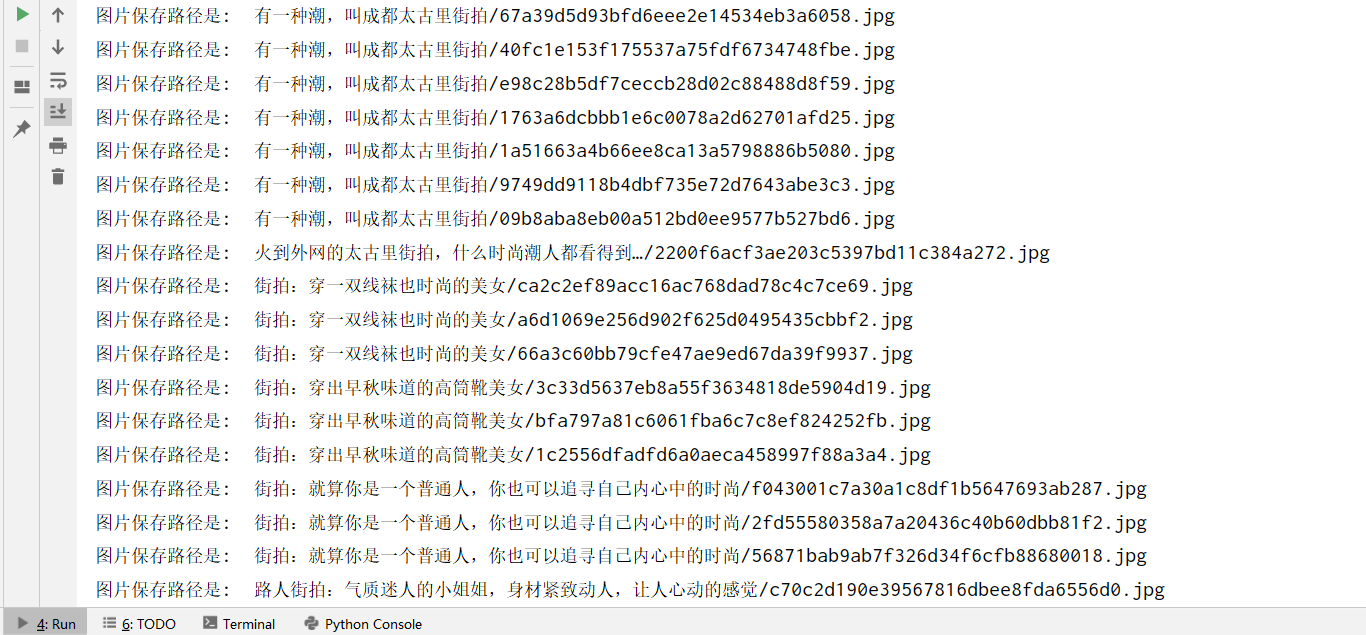 结果文件夹
结果文件夹
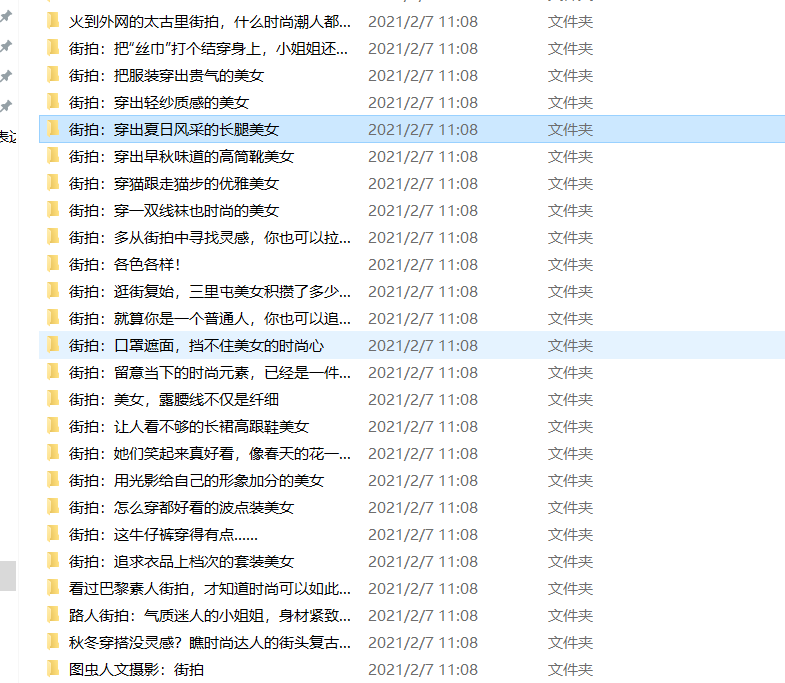 打开一个文件夹
打开一个文件夹

文件夹太多,我们修改为一个文件夹

结果

结果文件夹


作者:电气-余登武。
码字不易,请点个赞再走。